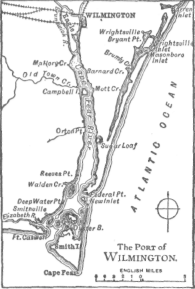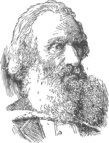WILSON 2091 t WILSON
Description
This page of the book is from "The New Student's Reference Work: Volume 4" by Chandler B. Beach, Frank Morton McMurry and others.
WILSON 2091 t WILSON
foundry and machine products. Among the prominent public buildings are the county court-house, city-hall, Masonic Tem-

ple, three hospitals, the United States Marine Hospital, two charitable institutions and 33 churches. There are public and parochial schools, and the city also contains Cape Fear Academy, Alderman's School, the Academy of the Incarnation (R. C.) and Gregory Normal School (colored). Wilmington was first called Newton, and was founded in 1733. During the Civil War it was a noted port for blockade runners until the capture of Fort Fisher at the mouth of Cape Fear Inlet by General Terry in January of 1865. In February of the same year General Schofield forced the Confederates to abandon Wilmington. Population 25,748.
Wil'son, Alexander, an American naturalist, was born at Paisley, Scotland, July 6, 1766. He was a weaver and peddler, and at 24 published a volume of poetry. In 1794 he reached Newcastle, Del., with but a few borrowed shillings in his pocket. While peddling through New Jersey he began to study the habits of birds, and after teaching some years he determined to form a collection of American birds. His first trip was made in 1804 through the unbroken wilderness of western New York to Niagara Falls. He gave an account of this journey in his poem of The Foresters. His position of assistant-editor of Rees' Cyclopaedia gave him more means and time for his undertaking, and, when the first volume came out in 1808, he spent some months in tramping, "looking for birds and subscribers."' He sailed down the Ohio to

DANIEL WILSON
Louisville, and rode on horseback from Nashville to New Orleans. He made another tour of the eastern states in 1812. He had, .however, overworked himself _ in preparing his book, and lived only to finish seven volumes. Two more were edited by George Ord, who had accompanied him on some of his journeys, and the work was carried further by Charles 'Lucien Bonaparte.. Wilson was the first to make a careful study of American birds, and_ his great work on American Ornithology is a scientific classic. The author died at Philadelphia, Aug. 23, 1813. Consult Difficulties Overcome by C. Lucy Brightwell.
Wilson, Sir Daniel, a Scoto-Canadian educator and archaeologist and from 1881 to 1892 president of Toronto University, was born at Edinburgh in 1 8 1 6 . .Famous "Kit North" was his brother. In 1853 -he was appoint- j ed professor of history and English literature in University College, Toronto, succeeding to the presidency in 1 8 8 1. His writings embrace Prehistoric Man; Prehistoric Annals of Scotland; Memorials of Edinburgh; Caliban the Missing Link; and a study of Chatterton. He was knighted in 1888, and died at Toronto, Aug. 7, 1892.
Wilson, Henry, eighteenth vice-president of the United States, was born at Farming-ton, N. H., Feb. 16, 1812. His proper name was Jeremiah J. Colbaith, which at 21 he changed for some unknown reason to that of Henry Wilson. His father was a day-laborer, and poor. When ten years old, the boy went to work as a farm-hand. He was greedy for reading, and before the end of his apprenticeship had read more than a thousand volumes. He then walked to Natick, Mass., and learned the trade of shoemaker, by which he paid his way through Concord Academy. After setting up as a shoe-manufacturer he became a noted public speaker in support of Harrison in the campaign of 1840. For the next ten years he was regularly elected to the legislature of Massachusetts. In 1848 he left the Whig party and became a Free-Soiler. In 1853 he was defeated for governor on the Free-Soil ticket, but two years later was made Sumner's colleague in the United States senate. Wilson had helped to form the anti-slavery society; throughout his political life he had earnestly upheld antislavery; and he became one of the founders of the Republican party. In 1872 he was chosen vice-president on the ticket with Grant, but died on Nov. 22, 1875. He left three important historical works: Antislavery


